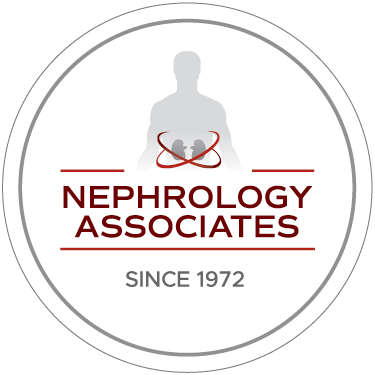Welcome to Nephrology Associates, with offices in Chattanooga, Ooltewah and Cleveland. We are committed to providing quality care in a convenient and friendly environment.
Kidney Disease
About Kidney Disease
According to the National Kidney Foundation, 37 million Americans have chronic kidney disease (CKD) and millions of others have increased risk.
Those considered to be at increased risk include people with hypertension, diabetes, or a family history of kidney disease. Early detection and treatment can help keep CKD from progressing.
At Nephrology Associates, we are committed to providing quality care in a convenient and friendly environment. We encompass all aspects of kidney care, from patient education in early disease state to pre-emptive transplantation and dialysis in those with advanced afflictions.
Our nephrologists lead a team of over 100 clinical, technical and administrative personnel, but you are the most important member of your health care team. We encourage you to learn all you can about kidney disease and its complications. The information provided in this section is intended to be a good starting point, but we do encourage you to be proactive in your communications with your physician, and with our practice.
Know Your Score!
While most Americans can recite their cholesterol numbers and know their personal risk for heart disease, few have any idea if their kidneys are performing their job properly. Yet there is actually a test that measures kidney function, and since kidney disease can be silent without any symptoms, it's important to know the kidney score.
Healthy kidneys that work at 100% capacity regulate blood pressure, filter wastes and toxins from the blood and help maintain strong bones.
"In order to measure how well the kidneys are functioning, doctors perform the glomerular filtration rate—or GFR test. GFR is calculated from the results of a blood test for creatinine, or buildup of waste products, as well as age, race, gender and other factors. The earlier kidney disease is detected, the better the chance of slowing or stopping its progression. In other words, knowing your GFR can save your life," says Dr. Joseph Vassalotti, Chief Medical Officer for the National Kidney Foundation
.“Anyone with high blood pressure, diabetes, or a family history of either of these conditions or kidney failure is at risk for developing kidney disease and must get their GFR checked on a yearly basis,” continues Vassalotti. “It’s a relatively easy test to perform.
"According to Vassalotti, it’s also important to have a simple urine test to check for a type of protein called albumin, since protein in the urine is an early indicator of kidney disease.
What the Numbers Mean
Although it may sound complicated, understanding GFR results is as easy as knowing a number and what it signifies in terms of kidney function. If GFR is over 90, the kidneys are healthy and functioning normally. A kidney score of 60-89 means the person should be monitored, and if GFR scores falls to less than 60 for a three-month period, that is an indicator of chronic kidney disease.
More than 555,000 depend on dialysis to treat kidney failure and every two hours, somebody dies while waiting for a life-saving kidney transplant. -Content from National Kidney Foundation - kidney.org
Stage 1:
GFR
> 90
Normal, but there may be signs of kidney damage (like protein in the urine). Regular monitoring and lifestyle changes can help slow progression.
Stage 2:
GFR
60-98
Function is slightly reduced. Patients may not have symptoms, but early signs of damage may be present. It’s important to manage risk factors like high blood pressure or diabetes.
Stage 3A:
GFR
59-45
Kidney function is beginning to decline more noticeably. Patients may start to feel symptoms such as fatigue. Monitoring and early interventions are important.
Stage 3B:
GFR
44-30
More significant loss of kidney function. Symptoms like swelling, anemia, and high blood pressure may occur. Regular nephrology care is typically recommended.
Stage 4:
GFR
15-29
Kidneys are significantly impaired. Patients often begin working closely with a nephrologist to prepare for potential dialysis or transplant.
Stage 5:
GFR
<15
The kidneys can no longer support the body’s needs, and treatment options like dialysis or a kidney transplant are typically necessary.
Advanced Care Planning
The CKD program at Nephrology Associates is designed to help you keep your kidneys as healthy as possible for as long as possible. You will meet with a team of health care providers who specialize in CKD. This team will work with you to set up a long-term treatment plan which will include:
Nephrologist
Your initial work-up with a Nephrologist or Nurse Practitioner will likely include an ultrasound and various blood and urine tests.
Lab Work
Our highly experienced Lab Team has the ability to provide test results efficiently and in a timely manner.
Chronic Care Managment
Your personal care coordinator will coordinate care between your Primary Care Provider, specialists, pharmacy, and assist with medications.
Remote Patient Monitoring
Patients are sent home with a blood pressure monitor and daily readings are sent to our care coordinator automatically.
Transitional Care
Some patients will receive a transitional care manager to assist with all needs and schedule follow up appointments after hospitalization.
CKD Education
Our CKD Nurse Practitioner will help you understand your stage of Kidney Disease and how to slow progression.
Nutritional Therapy
Our Registered Dietician provides nutrition therapy, including renal and diabetic diet education. Complete with grocery lists, meal plans and recipes.

